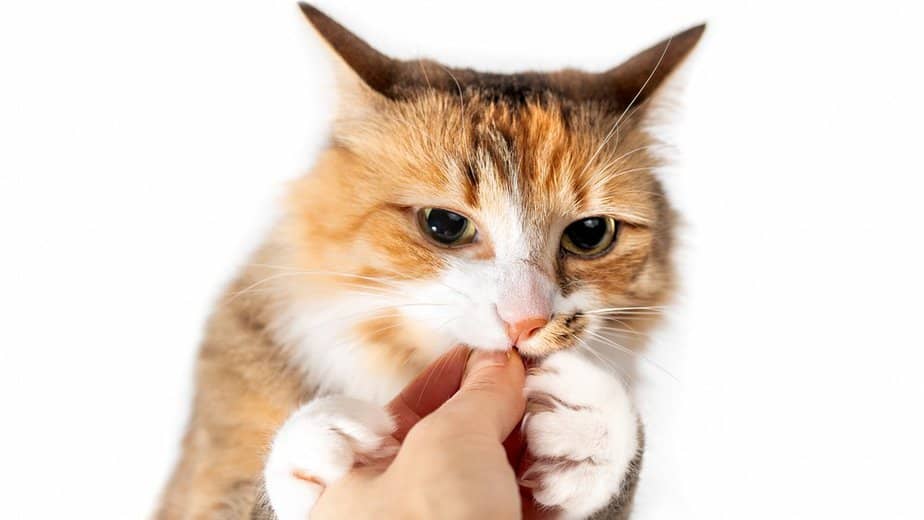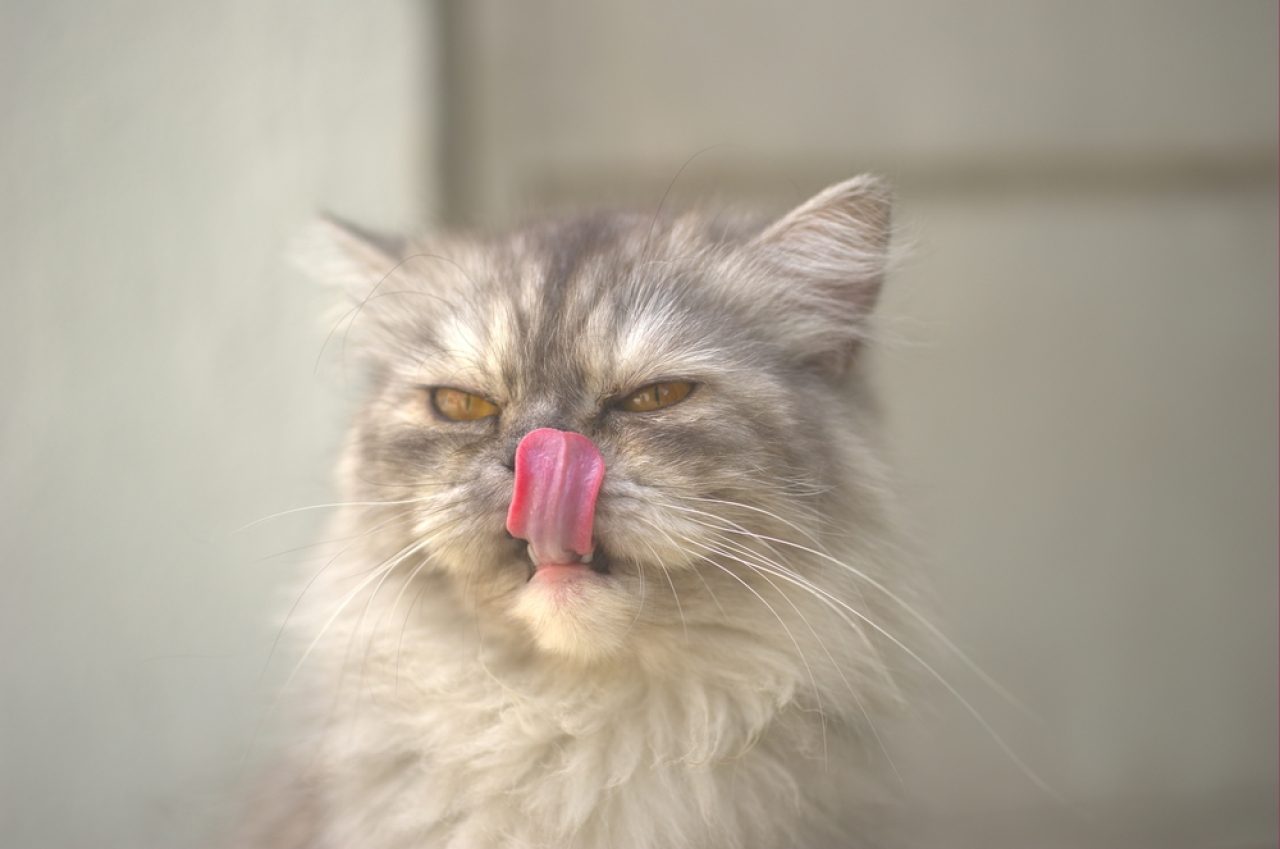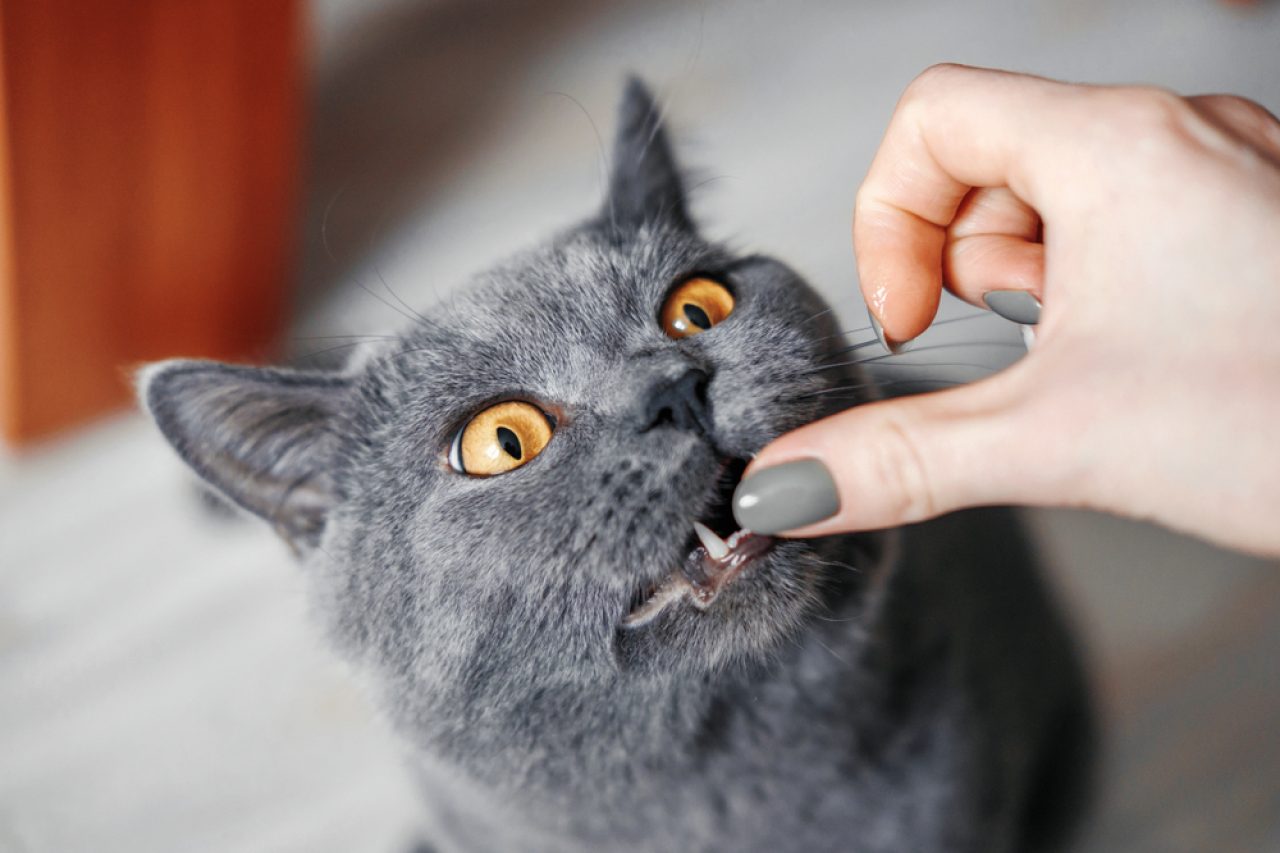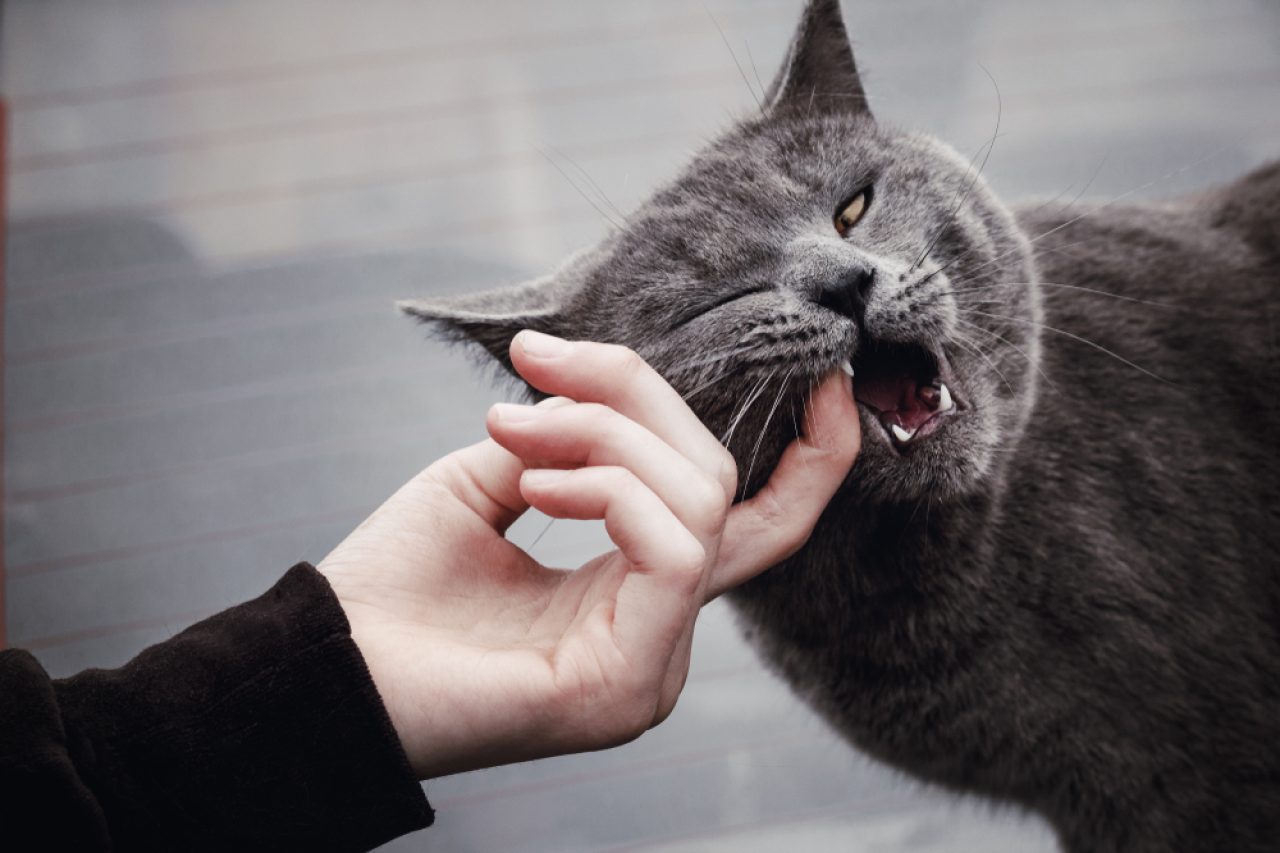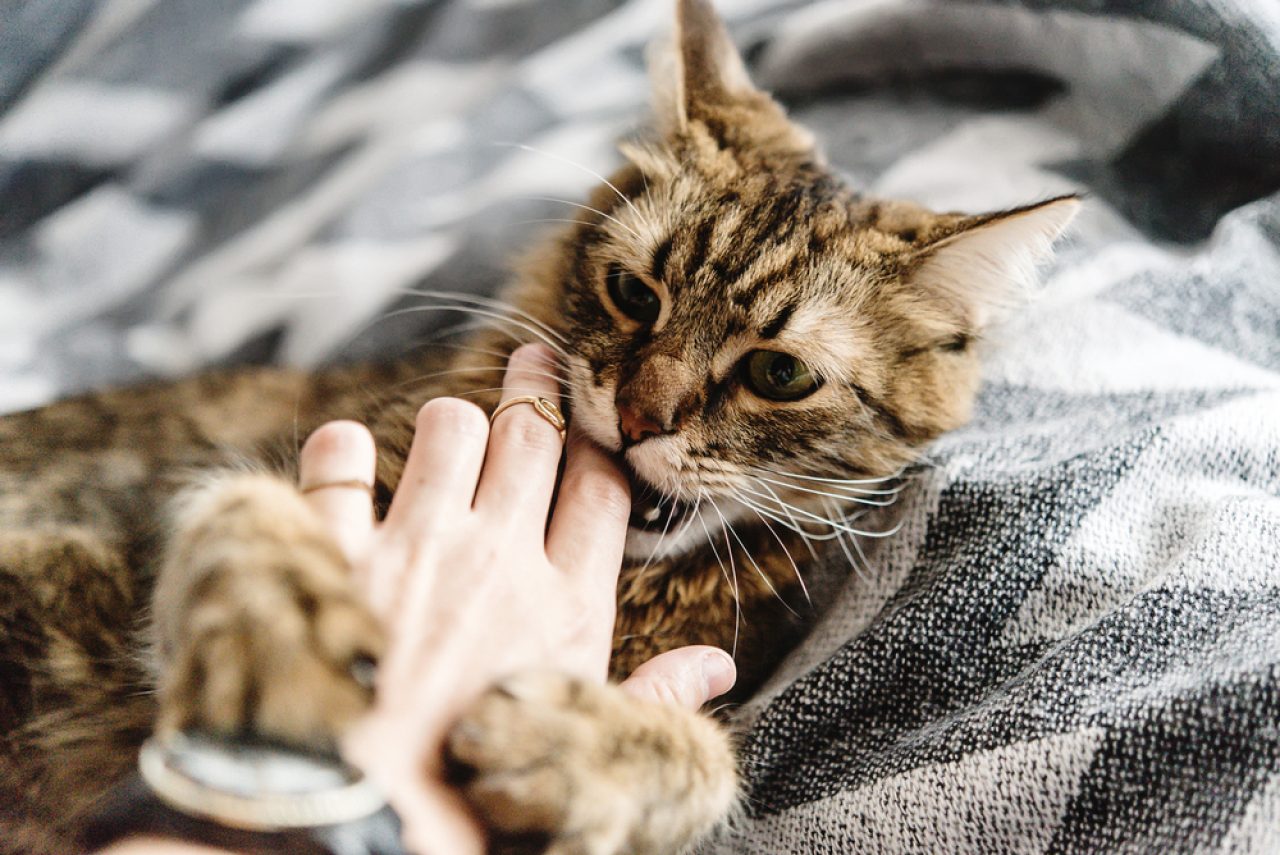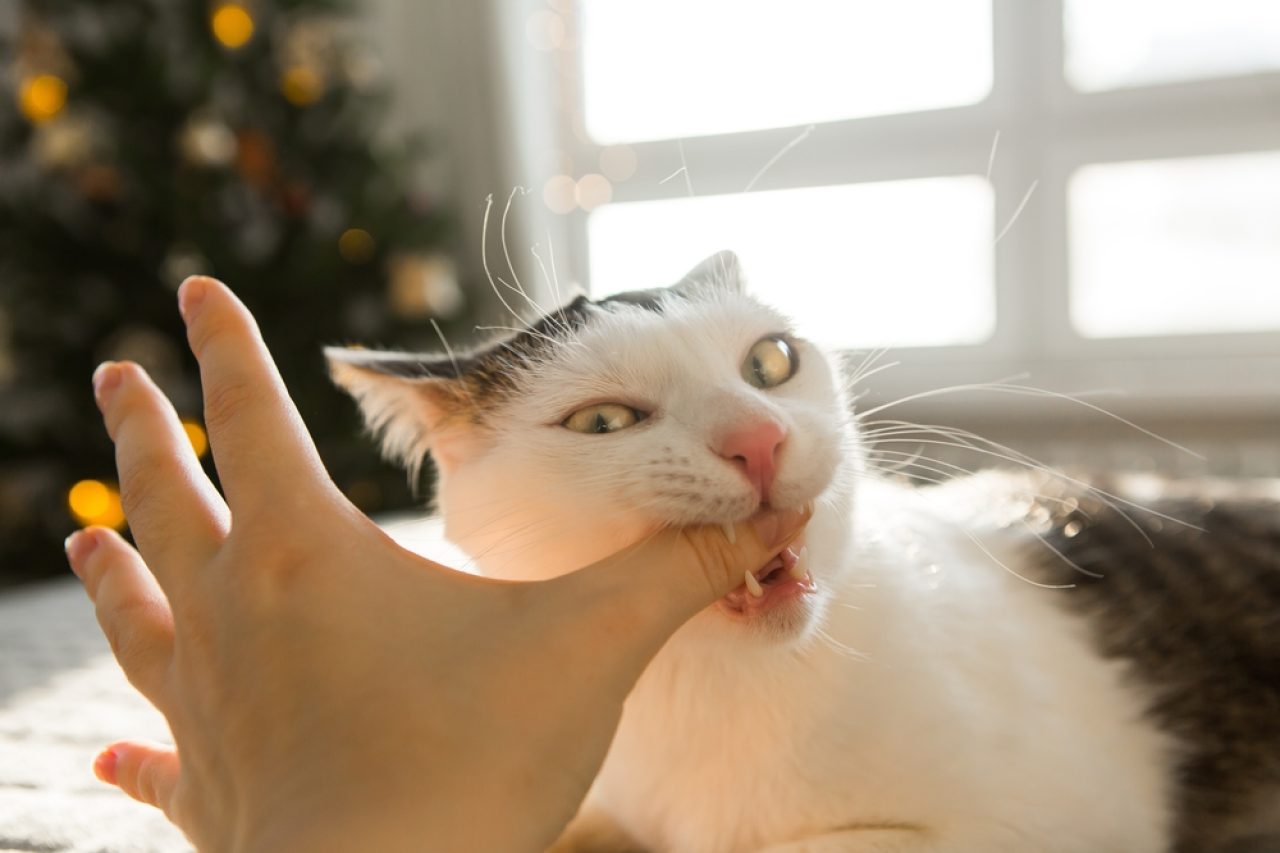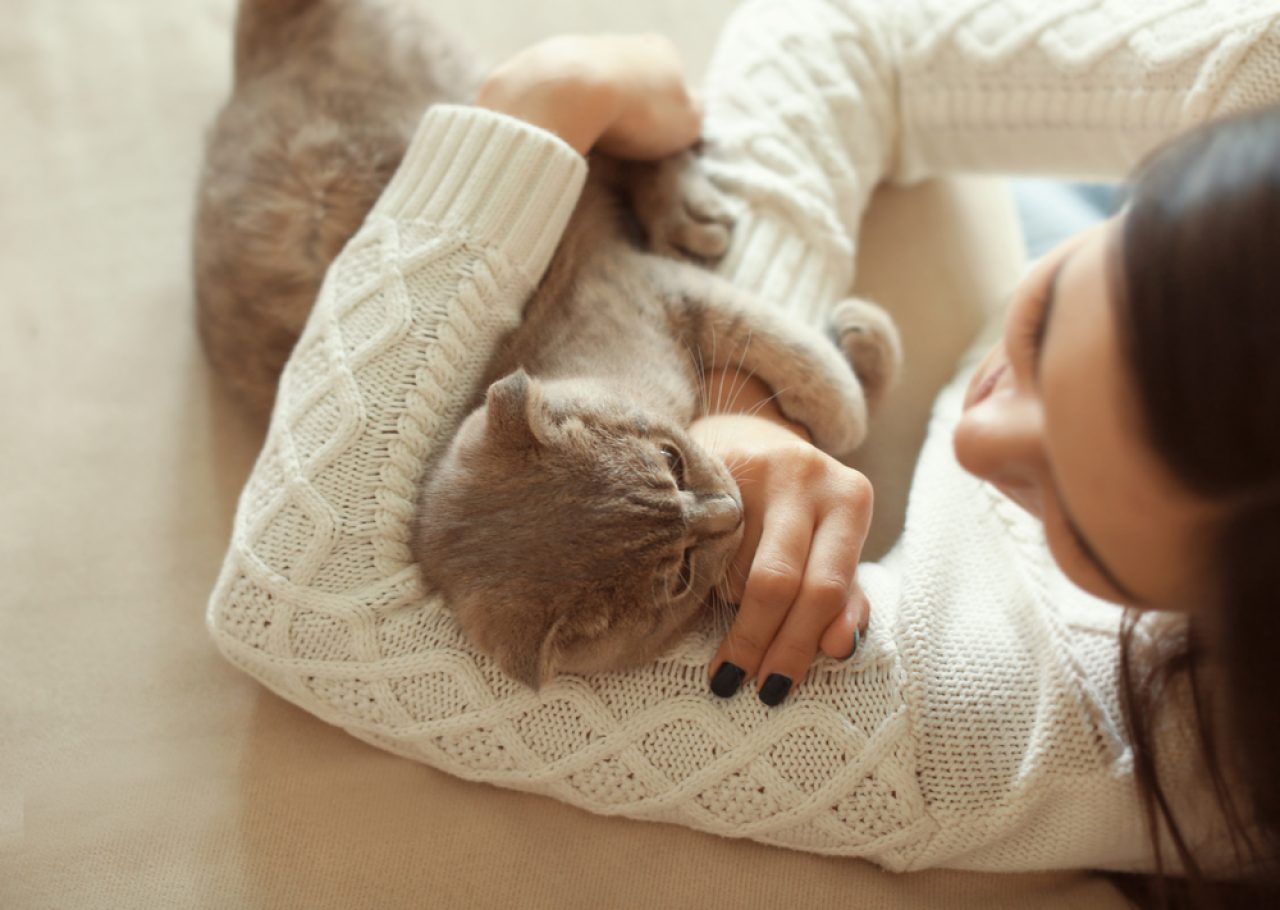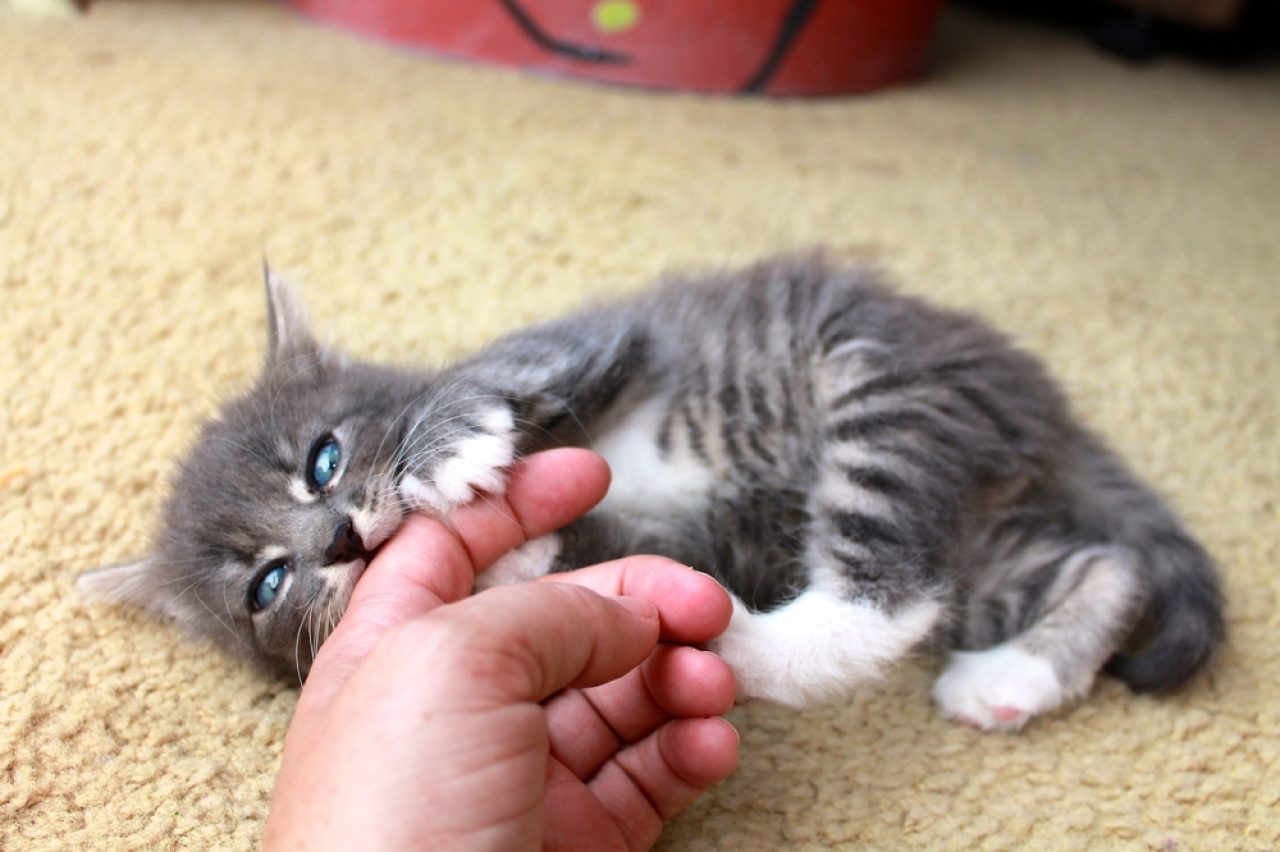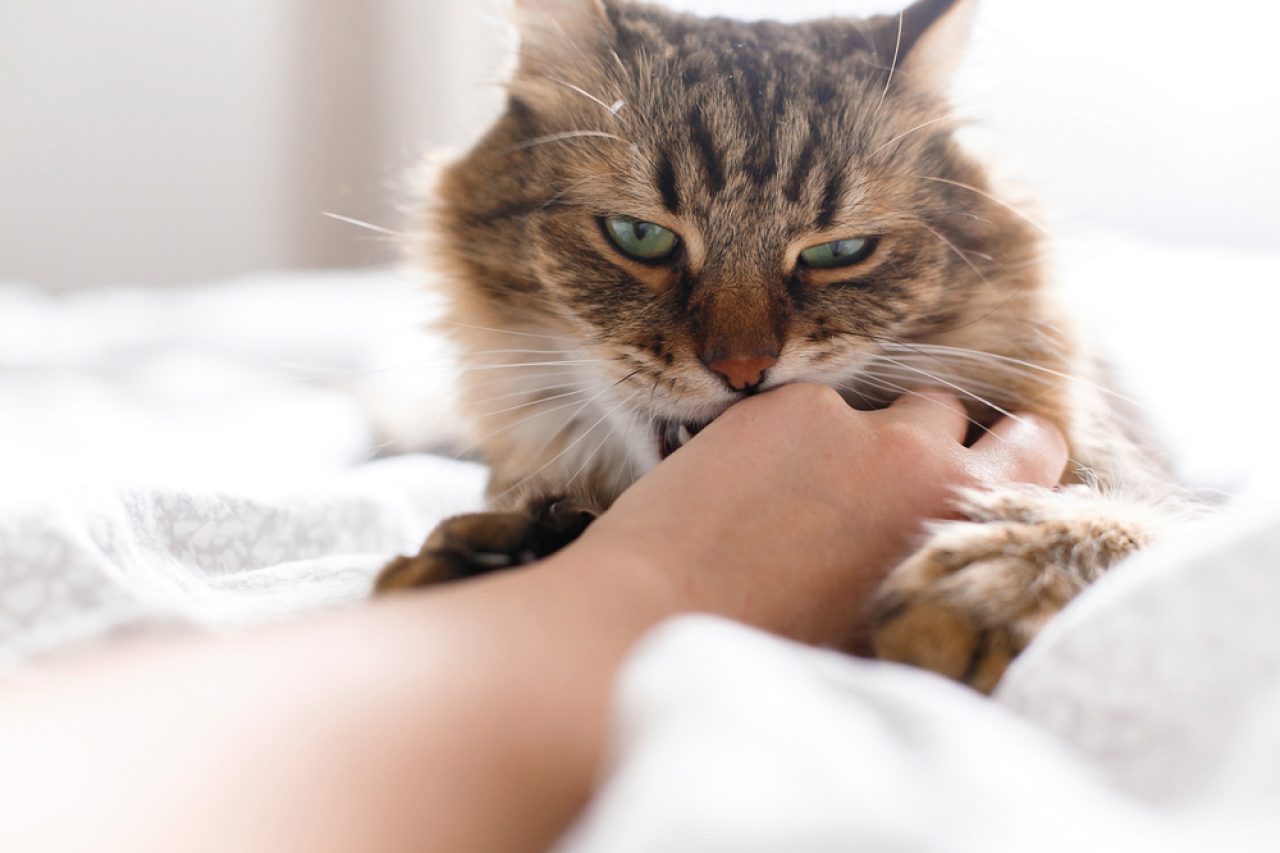📖 Table of Content:
You’re playing or cuddling with your feline, and she suddenly starts licking you. You think nothing of it so you continue your snuggle session when out of nowhere – ouch! She bites you. Sometimes it’s just a nibble and sometimes it hurts. But why does my cat chew on my fingers?
Regardless of if it’s painless or not, it’s never good to encourage this behavior. Even harmless suckling can lead to hurtful bites. But why do cats do this? Are they being affectionate and taking things too far? Or did I do something wrong and accidentally hurt them? Is it just aggression issues?
What if it’s a kitten? It doesn’t hurt when they do it, so it’s fine, right? But even in this case, you need to take action in order to stop it. Chewing quickly turns into a habit and it won’t be so cute when that kitten grows up and continues biting.
How do I stop it then? What steps do I need to take? We’ll answer all the questions you may have about this bad little habit. But first, we need to see why the licking occurs in the first place and how it leads to biting. Why are those licks so painful anyway?
Lick ‘n’ prick: cats’ prickly tongues
To answer the question “Why does my cat chew on my fingers?”, we first need to take a look at licking. Before your feline starts suckling, chewing, or biting your hand, it’s very likely she’ll be licking. But why would this be such a problem? We love when dogs lick us.
Well, you might have noticed that kitty licks aren’t that enjoyable. In fact, they hurt quite a lot. The worst part about puppy licks is the drool but with felines? It’s almost like getting brushed with sandpaper. Why is that?
Cats’ tongues are covered in these tiny spikes called papillae. And if hearing the word “spikes” didn’t make you go yikes, this will: they’re made of keratin, the same thing human nails are made of. They’re shaped like claws with very sharp tips and are mainly used for two things.
First and foremost, they’re there for the purpose of tearing flesh. Both housecats and wildcats have them. When they manage to hunt down their prey, their tongues help as an extra tool for tearing meat off of bones. The second reason cats have them is grooming. The spikes make for an awesome comb.
Why does my cat lick my fingers?
There are three main reasons why your cat might be licking you. All three can easily lead to your cat chewing on your fingers.
Although the first two reasons aren’t harmful to her, they are painful for you. And the third is just bad times for everyone. But in most cases, it might be a combination of all three.
1. Territoriality
Cats love marking their territory and they do it in many different ways. Housecats usually do it by rubbing against furniture, licking it, scratching, etc. And they can also do this to you if they see you as part of their territory.
By licking your fingers or anything else, they’re transferring their scent to you. This way they claim ownership over you. While it seems like a sweet gesture, and it is tied with affection, it can quickly lead to nips. So, it’s best to stop it before it turns into something worse.
2. Affection
Momma cats show affection to their kittens via grooming. So, it’s only natural for those kittens to pick that trait up as they grow. However, there is such a thing as doing it excessively and this leads to problems.
Your feline grooming you too often might be a sign that she was separated from her mother too early. Suckling and kneading while doing it often accompanies it. While it is flattering that your cat feels safe around you, this habit needs to be prevented.
3. You taste good
No, your kitty definitely doesn’t want to eat you. But there could be some stuff on your skin that she finds tasty. If you noticed she only licks you after you’ve eaten something with your hands, that’s probably why. And that’s fine but there are other things on your hands that she shouldn’t be licking.
One example can be lotion or perfume. Sure, they may smell fruity and delicious but they’re highly toxic. Whenever you put some on, you need to keep your cat far away from your fingers. Consuming even the smallest amount is harmful.
So, why does my cat chew on my fingers?
Chewing and biting are almost sure to follow up licking. It seems super cute when it’s gentle or when you own a kitten. But you need to keep in mind that it never stops at that. Your cat is sure to get carried away and even worse, make a habit out of biting you. Here are the reasons why that might happen.
1. Overstimulation
If you’re petting your cat, she might immerse herself completely. So much so that she loses herself. This very quickly leads to overstimulation. Her brain basically cannot process so much pleasure that it needs to stop it somehow. And the way she does that? She bites.
Your feline isn’t actively trying to hurt you. She just doesn’t know how to cope with it differently. It’s up to you to know when and how to stop. The next time you ask yourself why your cat is chewing on your fingers, remember it’s not really her fault.
Luckily, there are ways to notice when a cat is about to reach a state of overstimulation. They tend to flick their tail around, their ears twitch, or they might even seem a bit restless. However, not all cats show these signs. But we’ll show you how to deal with this later on.
2. Chewing on fingers as part of playing
This might be the most obvious reason. Cats are little predators! When playing with other felines or humans, they’re really just working on their hunting skills. Although housecats don’t really need to hunt, this pretend play is very important for their development and health.
Just don’t tell them they’re not actually in charge of getting the dinner for tonight. It might break their little kitty hearts. Allow them to play to their heart’s content. But make sure to help them differentiate between what’s okay to bite and what’s not right away.
Cat toys exist for a reason. If your furball chomps on a toy mouse, that’s no problem. But you need to teach her that your fingers are never on the menu. Not even during playtime. She won’t understand when it’s okay to bite and when it’s not, so it’s best to stop the behavior immediately.
3. Teething
Though it only applies to kittens, it’s important to mention. Many people excuse their cats chewing on their fingers because they’re still young. And while yes, teething is a very uncomfortable process, hands aren’t the thing you should be giving to your feline.
There are plenty of special toys and treats made specifically for kittens that are teething. I know it’s heartbreaking to pull your hand away when you know how sore and irritated your furball feels. But she will be much more grateful for those toys than your fingers.
And I know it might not seem like a big deal to allow them to munch on your hand. “It’s just until their new teeth grow!” But, even letting them do it during a relatively short process can cause trouble. It’s easiest to form habits when young. Don’t allow yourself to make a biter out of your kitty.
4. Stress chewing
If your cat is chewing on not only your fingers but other things too, the cause might be stress. Chewing and suckling are one of the most common indicators of stress and/or anxiety. Some others might be scratching, spraying, etc.
Stress causes vary from breed to breed. The usual ones are rearranging furniture, moving houses, being away too much, and punishments. Another reason might just be that you own a cat that has been separated from her mother too early.
If you suspect that your feline might be stress chewing, it’s best to take her to a vet. He’ll be able to get to the bottom of your furball’s anxiety. Then you’ll be able to find the best possible solution together and give your cat the help she needs.
5. Maybe she just likes chewing fingers
A bit funny, I know, but it is possible that your cat just likes chewing fingers! A lot of felines like exploring textures and flavors and yours might have an acquired taste for hands. Or they might just like munching on stuff and your fingers were the closest thing to them.
Either way, it’s not nice being a feline’s chew toy. You need to stop this behavior as soon as possible. The longer you allow your cat to do as she pleases, the harder it’ll be for her to change. Not to mention, this habit can potentially be dangerous for her, too.
If your cat likes chewing on fingers and other things, she might be nibbling on cables too. You need to be careful when you leave her alone in a room. Take notice of any harmful objects and remove them if no one’s there to watch over her.
6. Weaning too early
What is weaning? If you’re not a cat breeder, you might be unfamiliar with this term. It’s a process of getting a kitten accustomed to solid food. It starts at around 4 weeks of age and is usually done by week 8/9.
Sometimes if a breeder wants to sell kittens sooner, he’ll start the process too early. This often leads to anxiety in cats, and they end up developing various coping mechanisms. Self-soothing is the most common one.
It can look like excessive grooming or more commonly, suckling. Most felines use blankets or pillows, but that changes when they discover our body parts. Human skin reminds them of their mother much more, so they’ll suck on anything from fingers to earlobes.
7. Aggression
It is possible for your cat to bite you out of aggression. But if that happens, you’ll know it. There’s no doubt when it comes to recognizing signs of aggression. Before biting you, there will be definite warnings from your feline.
Those can include hissing, ears bending backward, her fur raising, body lowering, and similar. She’ll try to make you turn away and leave her alone before actually hurting you. Every animal will always avoid direct confrontation if possible.
But why would a cat even consider hurting her owner? Well, it depends on where you got your feline from. Aggression is most commonly a trait of rescued or taken-in cats. There’s always a chance that they had been abused before adoption.
Their previous bad experience with people makes them untrusting of others. If this might be the case with your cat, see if you can take her to the vet. He’ll give you guidelines on what you should do next and how to help your baby.
8. Hunger
Although pretty rare, it is possible! Cats will stop at nothing to get what they want. We already know they love yelling to get our attention and let us know they’re hungry. But would they bite for the same goal? Well, under some circumstances, yes!
Cats and a lot of other animals have a weird logic system that they use for everything. “If I do this, this good thing happens.” They don’t understand the concept of “wrong,” so the only way to get them to do something is to reward them.
Because of this, you might have accidentally trained your cat into unwanted behavior. So, let’s imagine this. She yelled a lot and nipped you one morning in hopes of getting food. You got so annoyed at her that you gave her breakfast early just to make her stop. You can bet she remembered that well.
Her kitty logic connected biting and food together, so now she might nip you whenever she’s hungry. It’s silly, I know, but this is why we need to be mindful around our pets. Our way of thinking is so different that it’s easy to make mistakes.
How to stop my cat from chewing my fingers?
Whichever reason your cat may have for biting you, one thing’s certain. You need to stop this behavior. There are several different ways of doing this. You can try whichever you feel might work best with your kitty.
So now that we’ve finally answered, “Why does my cat chew on my fingers” let’s try to stop it. Here are what we find to be the most effective ways of ending this habit.
1. Pick her up and put her down
If your cat gets overly rough during play, this is the best way to stop her. And no, we don’t mean to pick her up like her mother would. We don’t recommend ever doing this. Your cat is no longer a kitten, and you are not her mom.
The best way to pick her up is gently by her body. If possible, scoop her up entirely securing her legs, too. And then slowly put her back down. Maybe a bit farther away from you. Repeating this action will calm her and she’ll lose interest in chewing.
2. Not enough toys!
If your cat likes chewing on fingers, it might be because she doesn’t have enough toys. And we don’t mean just any toys. A feline that likes biting will prefer toys with different textures. That’s why it’s important to have a lot of them available.
If she only has toys with the same hardness or any other quality, she’ll get bored quickly. That will cause her to search for stimulation elsewhere. And your fingers have a pretty interesting texture. Not to mention, they usually taste good, too.
So, you better get her something like this multi-texture scratching post since it’s going to challenge her sense of touch. Different parts of it will definitely keep her entertained for hours which is exactly what you need.
3. Yelling “no” won’t help
Not only do cats not understand the word “no”, but it’s also completely impractical. “No” is a very common word in everyday conversation so it’ll be very confusing for your furball. And if you’re particularly aggressive when saying it, she might even start to fear you.
Some have suggested using “us-uh” instead because it’s less frequent than “no”. But in the end, it has the same effect. There are so many good ways to stop unwanted behavior. Forcing your cat to try to understand your language and logic is not one of them.
4. Consult a vet
If your cat is having problems with aggression, it’s best to consult a vet. It’s very painful to deal with a cat that would be prepared to hurt you. It takes a person of great strength and patience to help these felines get used to a safe home.
You need to know that you’re not alone. The vet is your best friend when it comes to this. He’s there to help and guide you as you heal your sweet furball. Never forget how noble what you’re doing is and never give up on that little fuzzy ball of nerves.
Another instance when it’s best to call a vet is if your kitty was weaned too early. He’ll be ready to give you all the tips to stop her from licking you instead of her blanket. Rarely can a cat be cured of its anxiety, but the vet will help you develop the best coping techniques.
5. Never use punishments
We already talked a bit about a cat’s logic system. They only understand rewards. Punishments don’t show them that what they did was bad. To them, it just looks like you hate them. So that’s why you must never use water bottles, timeouts, or anything of the sort.
It can cause severe trauma for your poor feline. She’ll never see you the same way again. Your cat will feel lost, confused, and afraid. Any trust she might’ve had will be gone. And all that stress will almost definitely make her behavior even worse.
6. Never allow her to chew your fingers
One of the biggest mistakes people make is only sometimes forbidding their cat to bite them. If you’re googling “Why does my cat chew on my fingers?”, you probably also want to know how to stop it. And the only way to do it is with stubborn consistency.
If you allow your cat to chew on your fingers when it’s gentle play but forbid it at other times? You’re just confusing her. She cannot tell the difference. So, if you want her to stop for good, you need to be firm and decisive. No more going soft because of those kitty eyes.
Why does my cat chew on my fingers? A summary
As you’ve seen, biting is a very complex issue. From the innate urge behind it to all the possible reasons for its occurrence. It’s difficult to get a grasp of and understand. You need to know your cat’s history and her personality, as well as your own habits.
It can be a confusing and frustrating process of trying to uncover the exact reason. There are so many that it’s easy to get lost. Not only that but there’s always a chance of it being multiple reasons linked together! It’s especially hard because you want it to be over as soon as possible!
We know it’s very tiring, but we hope that this article helped at least a bit. Now you should be able to understand what you’re looking for. And once you find the reason, you’ll know exactly how to help. We wish you and your kitty luck and hope for your soon-to-be bitemark-free hands!
